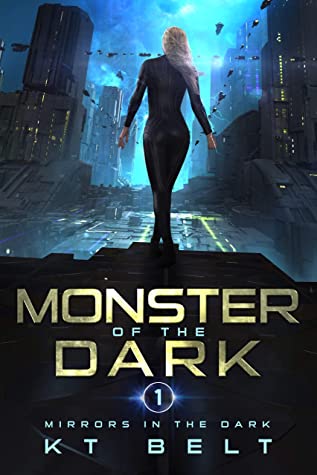
By Mike Glyer: On the morning of Carmen Grey’s sixth birthday an armed team arrives to take her from her parents and remove her to the underground facility where Clairvoyants — like her — are held captive and trained for years to access their abilities. So begins Monster of the Dark by K. T. Belt, a finalist in the Self-Published Science Fiction Competition.
Both the potential for human Clairvoyants and the need for them was realized when aliens tried to conquer humanity in a war that occurred before the present day of this story.
The Clairvoyant “assets” of Monster of the Dark are recognized as being so important to humanity’s ability to fend off threats of alien domination that they are completely deprived of human rights until their eighteenth birthday so their abilities can be maximized. In that way, their fate contrasts with Marvel’s X-Men. The X-Men are mutants with an extensive palette of different superpowers who are often denied civil liberties or actively persecuted even while they sacrifice to protect an unappreciative public. The contrast is that unlike the empathetic X-Men, the Clairvoyants don’t relate to ordinary people, therefore they not only train for combat, they must rehearse having social abilities to which they are actually indifferent.
David Gerrold once advised me that a reviewer should determine what the writer of a novel is trying to accomplish and judge the book by how successful the writer is in achieving that purpose.
From that vantage, Monster of the Dark is well-written. It’s not a hard read. The author keeps you curious about what the next round of training will be and why that choice makes sense.
However valuable that advice is, I consider it just as important to review my experience as a reader of the book.
My experience was that the book revolved around cruelty to children. Even to pets. Clairvoyants learn to fight with a high degree of proficiency by killing an endless supply of live opponents – some kind of low-mentality clone; that doesn’t require any moral qualms, right? Am I not entertained?
I rapidly reached a point in this book comparable to my reading of Pablo Baciagulpi’s The Windup Girl, which I quit in the middle because I wasn’t willing to read about the protagonist’s abuse as entertainment. Apparently that’s just me – the book went on to win the 2010 Best Novel Hugo.
I wouldn’t ordinarily have finished Monster of the Dark. Your mileage may vary, as they say – the book is an SPSFC finalist after all; other judges liked it.
Nor can I fully explain what may be a contradiction in my response to other novels. For example, in Robert Crais’ detective novel series, Elvis Cole’s partner Joe Pike is an abuse survivor and a couple of those books have flashback scenes to his childhood. I think those are incredible books. Go figure.
Setting that discussion aside, I have one other major concern about how little foundation has been laid for this book’s ending. At the very end someone who’s been a determined antagonist of Carmen’s finally decides oh we’re pals now for no reason at all. If it was going to happen it should have been after one of their earlier confrontations. And a deus ex machina boyfriend Carmen barely spent time with long before drops back in from nowhere. World events begin to unravel in ways that are meant to hook our curiosity about the next book in the series. Maybe Carmen’s twelve years of training will be put to its intended use in combat. But not in this book!

